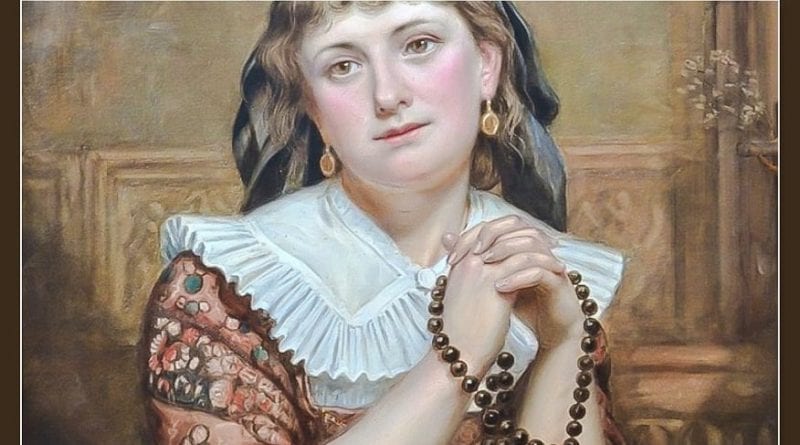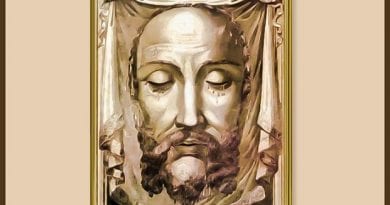Fruits or Virtues of the Rosary What are they and why do we pray for them?
You Will Know Them by Their Fruits
The Oxford Dictionary defines virtue as behavior showing high moral standards. As Christians, our goal is to please God. We honor Him in the way we live our lives and we strive to live a virtuous life. We want to bear good fruits. The goal of a virtuous or fruitful life is to become like God.
Every tree that does not bear good fruit is cut down and thrown into the fire. So then, you will know them by their fruits.
“Not everyone who says to Me, ‘Lord, Lord,’ will enter the kingdom of heaven, but he who does the will of My Father who is in heaven will enter.
~ Matthew 7:19-21 ~
The Catechism of the Catholic Church teaches us:
“Whatever is true, whatever is honorable, whatever is just, whatever is pure, whatever is lovely, whatever is gracious, if there is any excellence, if there is anything worthy of praise, think about these things.”
A virtue is a habitual and firm disposition to do the good. It allows the person not only to perform good acts but to give the best of himself. The virtuous person tends toward the good with all his sensory and spiritual powers; he pursues the good and chooses it in concrete actions.
~ Catechism of the Catholic Church ~ 1803 ~
The Virtues of the Rosary ~ Guiding Us Toward a Sanctified Life
Each mystery of the Rosary is connected to a certain virtue. As we meditate upon each mystery, we come to understand its connectedness to each virtue and as our understanding deepens, our desire to attain this virtue becomes greater. So, as we pray the Rosary and reflect upon each mystery, we ask Our Lady to pray with us that we may grow in virtue to please and become more like her Son. It is said that of all virtues, the greatest is humility. Without humility, our pride will prevent us from working to reach any other virtue. But Our Lady guides us. With Mary as our example, we pray humbly and we understand that we have much to learn; that life is a series of lessons and opportunities to practice these virtues.
“To reform. Every day a little. This has to be your constant task if you really want to become a saint.”
~ Saint Josemaría Escrivá ~
The Virtues in the Joyful Mysteries
The Joyful Mysteries
Annunciation: Humility
Visitation: Love of neighbor
Birth of Jesus: Detachment
Presentation: Obedience
Finding in the Temple: greater commitment & devotion to Jesus
Reflecting upon the Annunciation, we can clearly see Mary’s humility. She considered herself a lowly child yet she is being asked to bear the Son of God. “Behold, I am the handmaid of the Lord. May it be done to me according to your word.”
Also, in this mystery, you can see the virtue of obedience.
“Our Lady listens attentively to what God wants, ponders what she doesn’t fully understand and asks about what she doesn’t know. Then she gives herself completely to doing the divine will: ‘Behold the handmaid of the Lord, be it done unto me according to your word.”
~ Saint Josemaría Escrivá ~
Virtues of the Glorious Mysteries
The Glorious Mysteries
Resurrection: Faith Ascension: Hope
The Descent of the Holy Spirit: gifts of the Holy Spirit
Assumption: To Jesus through Mary
Coronation: Final perseverance
Let us look at the Resurrection and its virtue of faith.
Mary knew, from the very beginning, what was to come, but her faith was so strong that questioning was never a consideration.
Throughout all her sufferings, she trusted. We ask for the virtue of faith. Surely it is easy to be faithful in good times but when life presents challenges and skies become gray, our faith may lessen. During times of trial, Holding on to our faith is most important. We must have the virtue of faith in order to trust that there is a light at the end of the darkness and we shall see it shine.
“By His Resurrection, Christ conquered sin and death, destroyed Satan’s dark kingdom, freed the enslaved human race and broke the seal on the greatest mysteries of God and man.”
~ Saint Nikolai Velimirovic ~
Virtues of the Sorrowful Mysteries
The Sorrowful Mysteries
Agony in the Garden: Trust in God
Scourging at the Pillar: Purity
Crowning with Thorns: Fortitude
Carrying of the Cross: Perseverance in trials
Crucifixion: Forgiveness for others
The Crucifixion ~ Forgiveness of others. How do we forgive someone who has wronged us? Betrayed us? Scourged us? And crucified us? Perhaps of all the virtues, this is the most difficult to attain. In order to forgive, we must put our pride aside and trade hatred for love; anger for peace, and forget revenge. If we cannot learn forgiveness from Our Precious Lord, we may never learn to forgive. It would give us favor to remember that the benefit of forgiveness is more for the one who has forgiven than the one being forgiven. It is a gift we give to ourselves.
”If a man finds it very hard to forgive injuries, let him look at a Crucifix, and think that Christ shed all His Blood for him, and not only forgave His enemies, but even prayed His Heavenly Father to forgive them also. Let him remember that when he says the Pater Noster, every day, instead of asking pardon for his sins, he is calling down vengeance on himself.”
~ Saint Philip Neri ~
Virtues of the Luminous Mysteries
Luminous Mysteries
Baptism: Openness to the Holy Spirit
Miracle at Cana: Mary’s intercession
Proclamation of the Kingdom & Repentance: Christian witness & conversion
Transfiguration: Courage to bear the cross
Institution of the Holy Eucharist: Greater love for the Holy Eucharist
When reflecting upon these mysteries, how could we not be drawn in by the Miracle at Cana? The fruit of this mystery is Mary’s intercession. They had no more wine. The host of the wedding would have been terribly embarrassed if there had not been enough wine through the days of this celebration. Our Lady saw this before anyone noticed. She called to her Son. What a magnificent example of Mary’s intercession. This is what Our Lady does for us. She goes to her Son on our behalf, at times we don’t have to ask. She knows. Mary just knows.
Also, this mystery offers us a reminder of an additional virtue; one that is most important. We are reminded of the virtue of obedience. “Do whatever He tells you.” Here, Mary tells us to obey her Son.
“In dangers, in doubts, in difficulties, think of Mary, call upon Mary. Let not her name depart from your lips, never suffer it to leave your heart. And that you may obtain the assistance of her prayer, neglect not to walk in her footsteps. With her for guide, you shall never go astray; while invoking her, you shall never lose heart; so long as she is in your mind, you are safe from deception; while she holds your hand, you cannot fall; under her protection you have nothing to fear; if she walks before you, you shall not grow weary; if she shows you favor, you shall reach the goal.”
~ Saint Bernard of Clairvaux ~
From “mysteries” to the “Mystery”: Mary’s way
The cycles of meditation proposed by the Holy Rosary are by no means exhaustive, but they do bring to mind what is essential and they awaken in the soul a thirst for a knowledge of Christ continually nourished by the pure source of the Gospel. Every individual event in the life of Christ, as narrated by the Evangelists, is resplendent with the Mystery that surpasses all understanding (cf. Eph 3:19): the Mystery of the Word made flesh, in whom “all the fullness of God dwells bodily” (Col 2:9). For this
The Rosary is at the service of this ideal; it offers the “secret” which leads easily to a profound and inward knowledge of Christ. We might call it Mary’s way. It is the way of the example of the Virgin of Nazareth, a woman of faith, of silence, of attentive listening. It is also the way of a Marian devotion inspired by knowledge of the inseparable bond between Christ and his Blessed Mother: the mysteries of Christ are also in some sense the mysteries of his Mother, even when they do not involve her directly, for she lives from him and through him. By making our own the words of the Angel Gabriel and Saint Elizabeth contained in the Hail Mary, we find ourselves constantly drawn to seek out afresh in Mary, in her arms and in her heart, the “blessed fruit of her womb” ( Lk 1:42).
Apostolic Letter
ROSARIUM VIRGINIS MARIAE
OF THE SUPREME PONTIFF
JOHN PAUL II
To the Bishops, Clergy and Faithful
On the Most Holy Rosary
“Those who say the Rosary frequently and fervently will gradually grow in grace and holiness and will enjoy the special protection of Our Lady and the abiding friendship of God.”
~ Bishop Hugh Boyle ~
Marilyn Nash http://www.Gardenias4Lina.com





